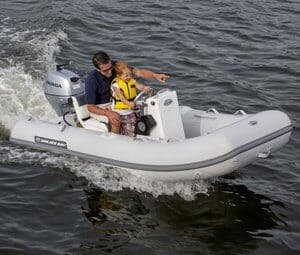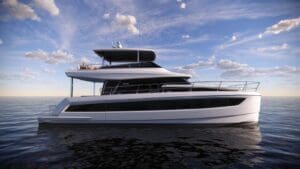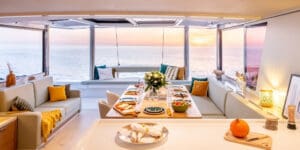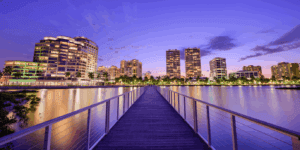Overseas Radio Network – Buy the Best Dinghy You Can Afford and Get a Good Davits
 Topics in Overseas Radio Network Show 7, Segment 3:
Topics in Overseas Radio Network Show 7, Segment 3:
We continue our discussion about getting off the grid.
- Dinghies are key to being independent while cruising
- Buy the best dinghy you can afford and carry
- Get a good davits
GARY FRETZ: I want to welcome you back to “Yachts: The Ideal Escape Vehicle”. Today we are talking about the ideal yacht to get off the grid. And Stephen is going to talk about dinghies. Now your dinghy on a yacht is like your car because when you are anchored somewhere you use that to get around to go to shore, get groceries, go make beer runs, go visit your friends, etc. Stephen, you want to talk about dinghies.
For a transcript of this podcast, click “read more” below. [Read about one of our current favorites, the Walker Bay Supertender Deluxe.]
Anchoring
STEPHEN COCKCROFT: Well you have a big electric winch on the back called the windlass with a gypsy which is designed to wind the chain up. How we organize it is when we go into an anchorage, I am at the helm and Estelle is at the bow. And she generally lets the anchor out. When we retrieve the anchor, my job is to go on the bow and Estelle does the driving so this is a very powerful winch and it winds the chain up and drops it into the anchor locker. And the, of course, generally, I like to pull it up by hand so we don’t have the windlass jamming the anchor against the bow rollers.
[See more tips from Catamaran Guru on anchoring:
You know, there are a few different ways…a few things to consider…when you get to a foreign port. You know you can either go into a marina. A lot of places have mooring balls that you can pick up. And, of course, the old traditional anchoring. I like to invest in good anchor…ground tackle as it is known. Because if you go to a marina obviously you are going to be paying. And even if it is cheap it is still an expense. And once you are on the dock of course you are going to plug into shore power, you are going to be charging your batteries, you are going to be using the water, and so you are starting to now get back on the grid.
Mooring balls are pretty good because they generally are pretty secure and they dive down. And so if you get a good plow, your mooring ball should hold. But my personal feeling is that if you spend the money on good ground tackle, you are safe as you could be and you are completely off the grid. I mean, just think of all the things you are going to miss you know.
You have no land line phone, no property tax, you got no car licenses fees, road taxes, no electricity bill, water bill, gardening service. There is no rent. There is no mortgage, no TV cable bill. Well, you can get TV cable now there is a track vision system that is satellite, so if you are really addicted to TV you can get it. No municipal rates or taxes for garbage collection. So there is a lot of stuff you are going to miss from living on the land. You know it is a waterfront life style.
GARY: And when you were cruising a few years ago just generally how often were you in a marina? When, I mean, how many days out of the month were you on the anchor?
Reduce Living Expenses by Anchoring
STEPHEN: In the Indian Ocean zero, never ever went to a marina. Never ever picked up a mooring ball. Red Sea was pretty much the same you know all the way up. We only started going into marinas, it was quite a new experience for us actually, is when we got into the Mediterranean. But of course we always anchored off when we could because it is expensive in the Mediterranean you know to go into marinas and, of course, anchorages are pretty crowded.
ESTELLE COCKCROFT: Yeah, we started off like Stephen said in South Africa you mostly anchor or you go into harbors. But then when we started sailing in the Indian Ocean it was always almost always on the anchor and we enjoyed that lifestyle because it is private. At the time, we didn’t have air conditioning on our boat, so you are out there in the breeze. And you know, again, it is freedom, it is independence, self reliance. And marina even though it is nice once in awhile, you get nice, you know, you can douse your boat with fresh water and so forth, we still prefer if we can to anchor off.
Doing Laundry Aboard
GARY: Speaking of dousing with fresh water, what do you do about laundry? Did you have a maid on that boat?
ESTELLE: Yeah, the laundry maid were my 2 feet and a bucket. At first that’s how I started off. In Madagascar we used to find these little streams and go and wash our laundry in the stream, as ridiculous as that might sound. But we were at the time, all we wore were swimsuits and T shirts and a sarong so we didn’t have much to wash.
Now, it is a different story. A lot of the boats, the modern boats, have washer and dryers and it is really nice to have although they are water guzzlers. And they are electricity guzzlers, so if I can I prevent doing that and I just take the laundry to a laundry facility on shore.
STEPHEN: Talking about clothes, etc., when your making passage you don’t really wear much anyway so there is not much to wash. And I know that sounds scary, but it brings to mind a story about an old buddy of mine, Pete. And he lived off the grid for about 20 years. He sailed around the world in a 34foot wooden double ender. Took him like 10 years his average speed was 3 1/2 knots but we met up in St. Martin and we were actually in the marina. He had his wife with him and we were going to go across to the Soggy Dollar Bar, which was his favorite bar in Simpson Bay. And Pete came over and he was barefoot and he said just lend me a pair of flops or something you know instead of going all the way to my boat to get flops. And I thought about it for a while and I looked at him and I said, “Pete, I got to be honest with you. I actually only have this one pair of shoes. I don’t own another pair. Of course, that’s changed living in America, you know.
Now we live on a dock…the umbilical cord plugged into shore power, water power, and all the rest of it. But you know it is amazing how quickly you can sort of go native again.
ESTELLE: Definitely the one thing, if people ask me you know what I would do differently if I go sailing, for sure, I would take less clothing. Because I loaded that boat up with everything I could possible think of. And a lot of it I had to throw away. It gets moldy. It falls apart. Things that we wore are out swim suits, T Shirts, and sarongs. For sure, no more clothes.
Modern Marine Electronics
GARY: Sounds like a great lifestyle. Let’s talk about electronics. There has been a lot of technology innovations in the recent years and there are a lot of great things that you can put on the boat. Some are absolutely necessary. The others are just kind of optional. but really nice to have. Can you talk about that?
STEPHEN: Yep, GPS has certainly, you know, opened up the oceans to many more people than used to be able to go out. I mean, I have only made one passage using a sextant and I did it to show myself that I could. It so much easier looking at your chart plotter and using your GPS. And so a good chart plotter and GPS, I guess, is absolutely compulsory these days.
GARY: What is a chart plotter? Can you explain that?
STEPHEN: A chart plotter is essentially like the navigation system that you put in a car that got your screens. And instead of having roads, it has the oceans and the depths and the lines the contour lines, etc., and rocks and bricks and whatever is there and your little boat that is going along. It is almost like playing video game. It is very accurate. So that’s a very important tool.
Another very important tool, in my opinion, is radar. You know, I use radar a lot. I even use it to navigate where there is coral by using a chart to see how far off a headland the coral extends and then making sure I don’t get close to it. And using my radar and the signature of the headland. So radar is pretty important and very comforting to have at night.
SSB radios…this s a big subject, you know. I have had SSB radios in all my boats. This boat, I decided not to put one in just right now. Because with the advent of sat(ellite) phones and the Iridium system has become so good that you can actually pick up weather, you can do emails, and in fact, you got voice calls. And I think that eventually what will happen is that Iridium sat phones are going to probably get rid of SSBs except for the old salty traditionalists who want to be struggling and trying to tune in and worrying about propagation and all sorts of things. But you know, not a bad thing to have. If I went cruising across the pacific I would probably install one.
VHF radio is very important. VHF is a line of sight radio and that’s used all the time. That’s like your telephone. That’s your landline. That’s how you call everybody. 16 is your hailing channel. That is where your radio nets are. That is where everyone communicates. That’s how you call mariners. That’s how you call other ships. That’s how you call authorities. So VHF is very important.
And then, of course, probably one of my favorite instruments is we have a Raymarine auto pilot fondly known as Ray. And Ray does all the driving when I am 10 foot off the dock I am already probably on Ray. You know, auto pilot is great these days. It is very little power and is very accurate so I think an auto pilot is absolutely essential as well. So that’s the basic instruments apart of your wind, depth, and speed.
GARY: Well, thank you. Looks like we are running out of time. And you will find us here same time that’s 3PM US eastern time on the Overseas Radio Network. And you have been listening “Yachts: The Perfect Escape Vehicle”. This is Gary Fretz. We will see you next week.





